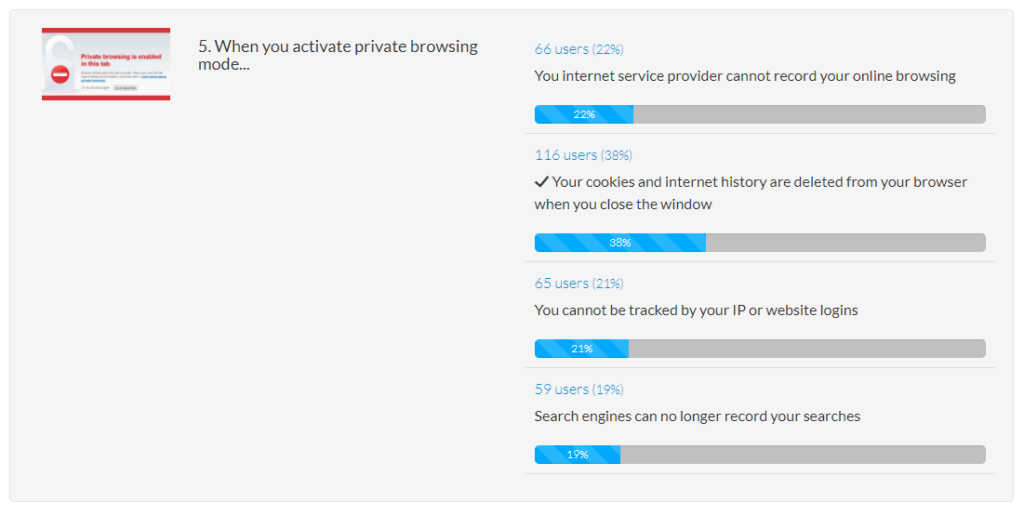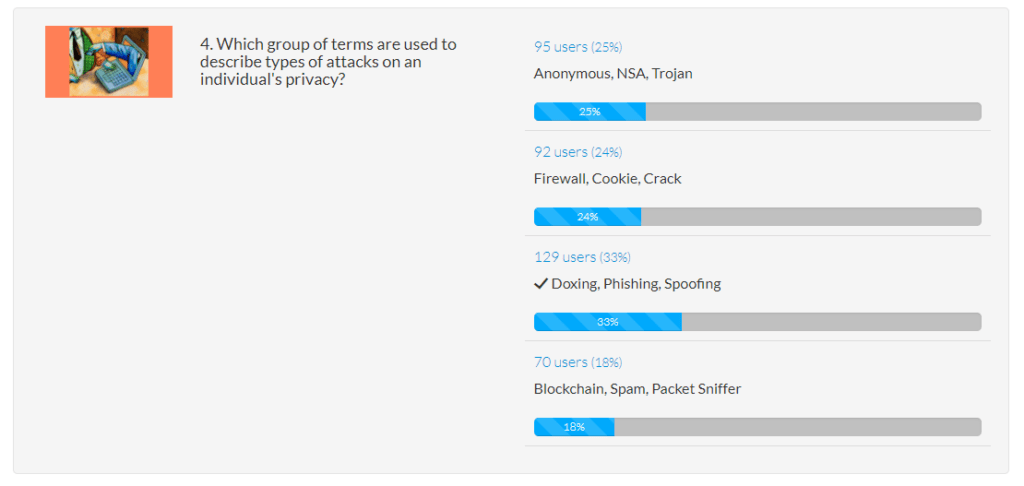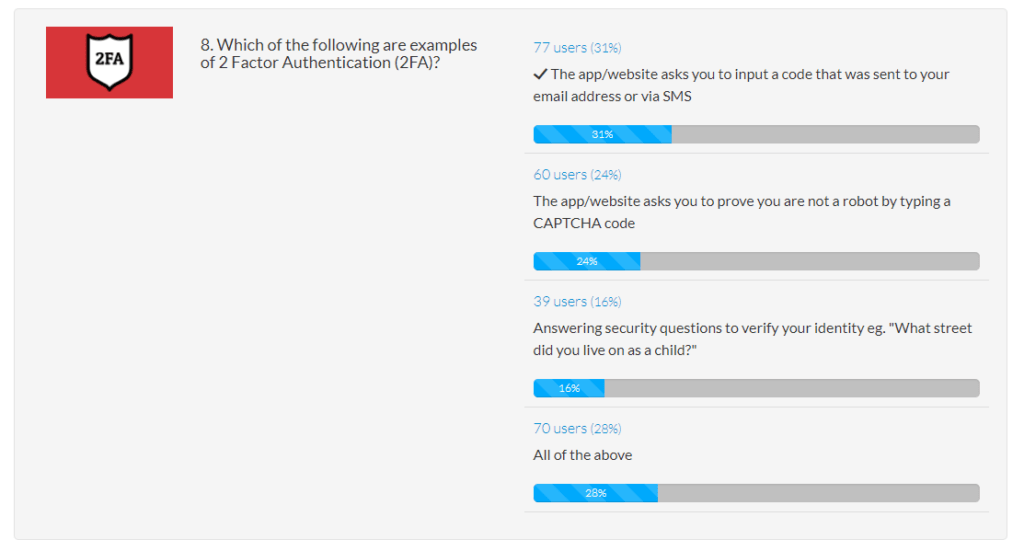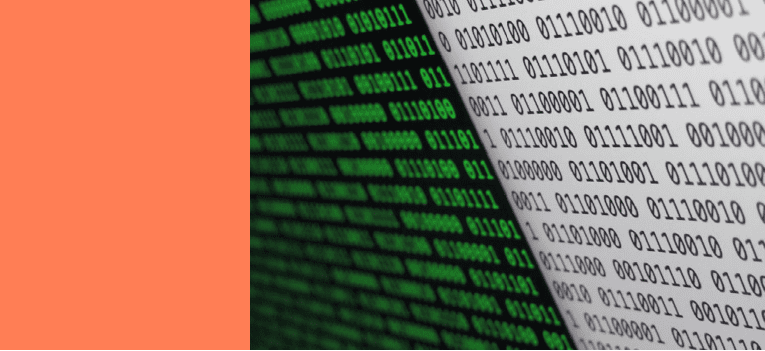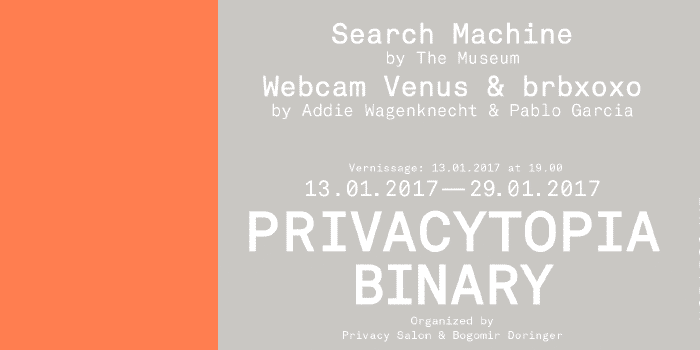Do You Even Know Anything About Online Privacy?
According to the respondents of our quiz…. not as much as we’d like.
For a start, you’re all terrified of jargon. Well, a lot of you are. When presented with the first question, “when entering information into a website, which protocol is recognised as being more secure”, nearly 3000 respondents ran screaming. Or closed their browser. Whatever. It wasn’t as scary as they thought it was, since 75% of those brave souls who dared answer the question got it right. The answer, by the way, was https://.
Nearly half of respondents, however, didn’t recognise a secure password when they saw it. If you want to run screaming at something, it should be that a staggering 20% of respondents thought that password is a secure password. More secure even than _w1rdPaSS2001, which was the correct answer.
Fortunately, when it came to situations where it’s okay to ask a web browser to remember your login details, 77% correctly recognised that doing it on a public or friend’s computer was a bad idea.
However, more than three-quarters of respondents were unable to name terms that describe the types of online attacks on individuals’ privacy, which are of course, Doxing, Phishing and Spoofing. In the defence of the 25% of respondents who answered Anonymous, NSA and Trojan, I can see where you were coming from on the NSA point, but let’s not go there right now.
A majority of users don’t have more than an owner-operator understanding of private browsing, as only 38% of respondents knew that activating private browsing mode deletes your cookies and internet history upon closing the browser. While respondents grasped that private browsing provided some sort of privacy, 22% of users thought it gave them privacy from their internet service provider, a further 19% thought that it gave them privacy from their search engine, and 19% thought it gave them privacy from… well, everything.
Fortunately, the majority of respondents redeemed themselves in recognising that their location can be traced through their smartphone even when the GPS setting was turned off, and in knowing that it’s literally never safe to do online banking on a public wifi account, even when it asks for a password.
31% of respondents know that 2 Factor Authentication (2FA) is when a website asks for a code sent to your email or SMS, while 38% of users knew a little of privacy legislation, recognising the EU-US Privacy Shield replaced the EU-US Safe Harbour Privacy Principles. This is likely because it hit the headlines last year as the law protects EU citizens’ data from US companies. An optimistic 16% of respondents thought that the new law was the European Convention on Human Rights, and while we might hope that one day, online privacy is included in the human right to a private life, it probably won’t be happening soon.
A promising 45% of respondents recognised the right to be forgotten as the right for EU citizens to request search engines remove results containing negative or personal information about themselves that violates their privacy. Again, this was a headline grabbing initiative that probably caught the public attention when it was introduced in 2006, expanded in 2014 by the European Court of Justice, and again when it hit the headlines this year when the Data Protection Directive was reformed to include this right.
One can only hope that the 14% of respondents thought that a Cookie is a tasty snack were being facetious. However, a total of 38% of respondents understood that a Cookie is also a text file saved on your computer so that advertisers can track your online behaviour and websites can give you a better experience when using their site.
In conclusion, aside from a promising start, only around a third of respondents of our quiz got all the answers right. Meaning a staggering 60-something per cent of respondents know little more than Jon Snow. And his password would almost certainly not have been as good as wiNter_15_coMing.
See some of the results below.
Do You Even Know Anything About Online Privacy?
According to the respondents of our quiz…. not as much as we’d like.
For a start, you’re all terrified of jargon. Well, a lot of you are. When presented with the first question, “when entering information into a website, which protocol is recognised as being more secure”, nearly 3000 respondents ran screaming. Or closed their browser. Whatever. It wasn’t as scary as they thought it was, since 75% of those brave souls who dared answer the question got it right. The answer, by the way, was https://.
Nearly half of respondents, however, didn’t recognise a secure password when they saw it. If you want to run screaming at something, it should be that a staggering 20% of respondents thought that password is a secure password. More secure even than _w1rdPaSS2001, which was the correct answer.
Fortunately, when it came to situations where it’s okay to ask a web browser to remember your login details, 77% correctly recognised that doing it on a public or friend’s computer was a bad idea.
However, more than three-quarters of respondents were unable to name terms that describe the types of online attacks on individuals’ privacy, which are of course, Doxing, Phishing and Spoofing. In the defence of the 25% of respondents who answered Anonymous, NSA and Trojan, I can see where you were coming from on the NSA point, but let’s not go there right now.
A majority of users don’t have more than an owner-operator understanding of private browsing, as only 38% of respondents knew that activating private browsing mode deletes your cookies and internet history upon closing the browser. While respondents grasped that private browsing provided some sort of privacy, 22% of users thought it gave them privacy from their internet service provider, a further 19% thought that it gave them privacy from their search engine, and 19% thought it gave them privacy from… well, everything.
Fortunately, the majority of respondents redeemed themselves in recognising that their location can be traced through their smartphone even when the GPS setting was turned off, and in knowing that it’s literally never safe to do online banking on a public wifi account, even when it asks for a password.
31% of respondents know that 2 Factor Authentication (2FA) is when a website asks for a code sent to your email or SMS, while 38% of users knew a little of privacy legislation, recognising the EU-US Privacy Shield replaced the EU-US Safe Harbour Privacy Principles. This is likely because it hit the headlines last year as the law protects EU citizens’ data from US companies. An optimistic 16% of respondents thought that the new law was the European Convention on Human Rights, and while we might hope that one day, online privacy is included in the human right to a private life, it probably won’t be happening soon.
A promising 45% of respondents recognised the right to be forgotten as the right for EU citizens to request search engines remove results containing negative or personal information about themselves that violates their privacy. Again, this was a headline grabbing initiative that probably caught the public attention when it was introduced in 2006, expanded in 2014 by the European Court of Justice, and again when it hit the headlines this year when the Data Protection Directive was reformed to include this right.
One can only hope that the 14% of respondents thought that a Cookie is a tasty snack were being facetious. However, a total of 38% of respondents understood that a Cookie is also a text file saved on your computer so that advertisers can track your online behaviour and websites can give you a better experience when using their site.
In conclusion, aside from a promising start, only around a third of respondents of our quiz got all the answers right. Meaning a staggering 60-something per cent of respondents know little more than Jon Snow. And his password would almost certainly not have been as good as wiNter_15_coMing.
See some of the results below.
Do You Even Know Anything About Online Privacy?
According to the respondents of our quiz…. not as much as we’d like.
For a start, you’re all terrified of jargon. Well, a lot of you are. When presented with the first question, “when entering information into a website, which protocol is recognised as being more secure”, nearly 3000 respondents ran screaming. Or closed their browser. Whatever. It wasn’t as scary as they thought it was, since 75% of those brave souls who dared answer the question got it right. The answer, by the way, was https://.
Nearly half of respondents, however, didn’t recognise a secure password when they saw it. If you want to run screaming at something, it should be that a staggering 20% of respondents thought that password is a secure password. More secure even than _w1rdPaSS2001, which was the correct answer.
Fortunately, when it came to situations where it’s okay to ask a web browser to remember your login details, 77% correctly recognised that doing it on a public or friend’s computer was a bad idea.
However, more than three-quarters of respondents were unable to name terms that describe the types of online attacks on individuals’ privacy, which are of course, Doxing, Phishing and Spoofing. In the defence of the 25% of respondents who answered Anonymous, NSA and Trojan, I can see where you were coming from on the NSA point, but let’s not go there right now.
A majority of users don’t have more than an owner-operator understanding of private browsing, as only 38% of respondents knew that activating private browsing mode deletes your cookies and internet history upon closing the browser. While respondents grasped that private browsing provided some sort of privacy, 22% of users thought it gave them privacy from their internet service provider, a further 19% thought that it gave them privacy from their search engine, and 19% thought it gave them privacy from… well, everything.
Fortunately, the majority of respondents redeemed themselves in recognising that their location can be traced through their smartphone even when the GPS setting was turned off, and in knowing that it’s literally never safe to do online banking on a public wifi account, even when it asks for a password.
31% of respondents know that 2 Factor Authentication (2FA) is when a website asks for a code sent to your email or SMS, while 38% of users knew a little of privacy legislation, recognising the EU-US Privacy Shield replaced the EU-US Safe Harbour Privacy Principles. This is likely because it hit the headlines last year as the law protects EU citizens’ data from US companies. An optimistic 16% of respondents thought that the new law was the European Convention on Human Rights, and while we might hope that one day, online privacy is included in the human right to a private life, it probably won’t be happening soon.
A promising 45% of respondents recognised the right to be forgotten as the right for EU citizens to request search engines remove results containing negative or personal information about themselves that violates their privacy. Again, this was a headline grabbing initiative that probably caught the public attention when it was introduced in 2006, expanded in 2014 by the European Court of Justice, and again when it hit the headlines this year when the Data Protection Directive was reformed to include this right.
One can only hope that the 14% of respondents thought that a Cookie is a tasty snack were being facetious. However, a total of 38% of respondents understood that a Cookie is also a text file saved on your computer so that advertisers can track your online behaviour and websites can give you a better experience when using their site.
In conclusion, aside from a promising start, only around a third of respondents of our quiz got all the answers right. Meaning a staggering 60-something per cent of respondents know little more than Jon Snow. And his password would almost certainly not have been as good as wiNter_15_coMing.
See some of the results below.




